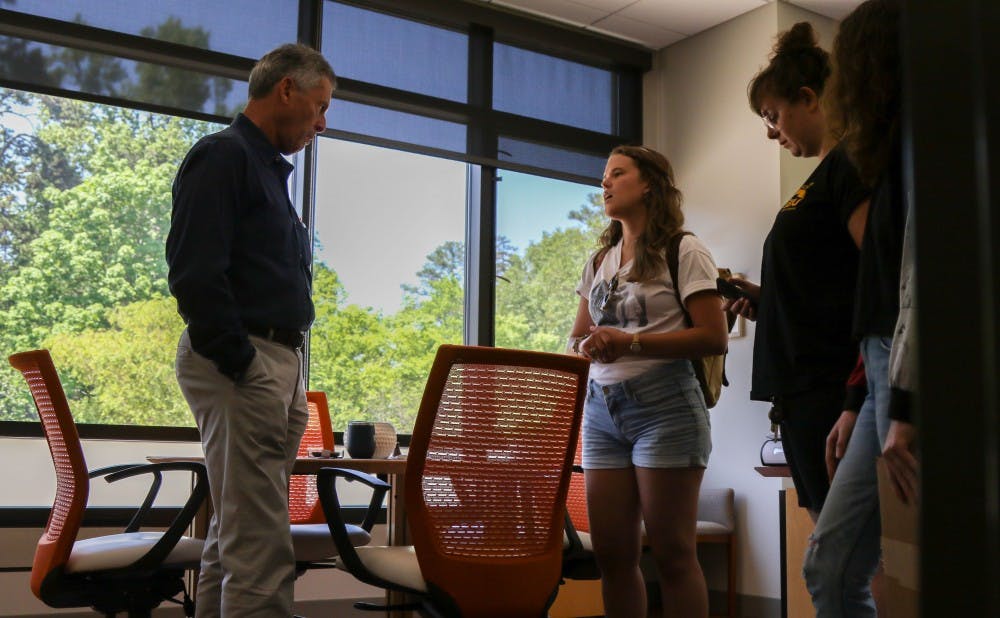Larry Moneta, vice president for student affairs, went to Joe Van Gogh Friday for his normal vegan muffin, possibly paired with hot tea. But then he heard the song that was playing.
Barista Britni Brown was playing music off her phone from a radio playlist and unbeknownst to her, she says, "Get Paid" by Young Dolph came on. When Moneta heard the song, which includes "n****" and "f***" in the lyrics, he asked her to turn it off—and she immediately complied, she told The Chronicle Wednesday.
Brown added that she kept the music to a low volume so she could hear customers’ orders and didn’t know what song was playing. She offered to give him his muffin for free to make amends, but Moneta demanded he pay for it.
Moneta has since said he was “offended” by the song’s lyrics.
“[I] found [it] quite inappropriate for a working environment that serves children among others," Moneta wrote in an email to the Chronicle.
Within a few minutes of Moneta leaving the shop on Friday, Kevin Simmons, the other barista on duty, said they received a call from Joe Van Gogh owner Robbie Roberts, who said Robert Coffey, executive director of dining services, had called about the music. Moneta wrote to the Chronicle that he voiced the concern to Coffey but that involvement stopped there.
By Monday, Amanda Wiley, an employee in Joe Van Gogh's human resources department, told Brown and Simmons to resign or be fired, saying that Duke instructed her to terminate their contracts.
But one question remains: whose decision was it ultimately to fire the two employees? The answer is murky.
Joe Van Gogh employees are contracted workers. IndyWeek, which first broke the story of the termination of the baristas’ contracts, wrote that the “incident highlights the precarious relationship between the university and its contracted employees, who are not afforded the same benefits and protections as Duke’s full-time employees, but whose employers are not in a position to defend them out of fear of losing business with the university.”
Roberts released a statement apologizing for how Joe Van Gogh handled the decision, but she also said that company personnel issues would remain private. Coffey, who Moneta initially spoke to about the incident, has not responded to multiple requests for comment over the phone and via email.
“We attempted to understand Duke’s position in this case, but we should have taken a different approach in making personnel decisions," wrote Roberts in a statement Wednesday. "As the owner of the business, I take full responsibility for Joe Van Gogh’s actions.”
But Indy Week reported from a recording of the Monday meeting in which the baristas were told to resign that Wiley said she had to make the decision due to pressure from Duke.
“Joe Van Gogh is contracted by Duke University, so we essentially work for them,” Wiley said. “And they can shut us down at any point.”
Brown says that Wiley repeatedly mentioned that it was Duke’s decision, not Joe Van Gogh’s. Wiley did not respond to a question from the Chronicle asking about the chain of command.
Brown said she pushed for Simmons not to be fired even if it cost her job because Simmons was unaware of the song being played. He says he was working with coffee grinders in the back of the shop and couldn’t hear it.
“What could I have done not to get fired? I just showed up to work,” Simmons said on Wednesday.
Moneta took a different approach.
"The employees who chose to play the song in a business establishment on the Duke campus made a poor decision which was conveyed to the JVG management," he wrote in an email to the Chronicle Tuesday.
Moneta, who has been a proponent of free speech on campus in light of racially charged incidents on Duke’s campus, has received hefty criticism for wanting to silence the song. The rapper Young Dolph even tweeted a response.
After two recent racially charged incidents, Moneta said that ‘Freedom of expression protects the oppressed far more than the oppressors.’
"To those who feel that I’ve flipped on my positions on free expression, I say this,” Moneta wrote in an email to the Chronicle. “The artist who wrote, recorded and performed the music is absolutely entitled to do so, however offensive I might find the lyrics."
On Wednesday afternoon, after protesters who had gathered outside of Joe Van Gogh went into Moneta's office to directly express their frustrations with him, Moneta wrote in a post on his Facebook page alongside Duke's official statement on the incident that he had never intended for anyone to be fired over it.
"I felt and still feel that the choice of music for the venue was inappropriate, but if my actions in any way lead to their dismissal, I apologize and hope that the JVG management consider ways to reinstate their employment with the company," he wrote.
Brown, who had been working at the coffee shop for approximately 16 months, said she would have no interest in taking the position at Duke back after the incident.
Get The Chronicle straight to your inbox
Signup for our weekly newsletter. Cancel at any time.

Managing Editor 2018-19, 2019-2020 Features & Investigations Editor
A member of the class of 2020 hailing from San Mateo, Calif., Ben is The Chronicle's Towerview Editor and Investigations Editor. Outside of the Chronicle, he is a public policy major working towards a journalism certificate, has interned at the Tampa Bay Times and NBC News and frequents Pitchforks.

